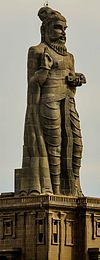Tirukkural translations into Chinese
| Part of a series on |
| Translation |
|---|
 |
| Types |
| Theory |
| Technologies |
| Localization |
| Institutional |
| Related topics |
|
As of 2015, the Chinese language had two translations available of the Tirukkural.
History of translations
[edit]The first Chinese translation of the Kural text was made by Che'ng Hsi in 1967, published by the Department of Indian Studies, University of Malaya and printed at the Hong Kong University Press.[1] The Nattukottai Chettiars Endowment Fund, which has also provided a Malay translation, funded the first Chinese translation.[2][3]
The second translation was made by Yu Hsi in 2014, which is a complete translation made in Mandarin.[1][4] It was first published in Taipei, Taiwan by Poem Culture Corp. The translation was released by former President of India A. P. J. Abdul Kalam.[5]: 40 It was reprinted in India in 2014 by the Department of Tamil Development and Culture in the Tamil Nadu state.[5]: 40–42 Yu Hsi's translation had earlier appeared as a Taiwan publication in 2010.[5]: 40
In addition, Parthasarathy et al. also list D. S. Rajan as the third translator of the Kural text into Chinese. However, the translation remains unpublished and he is said to have translated only 60 couplets in all.[5]: 42
Translations
[edit]| Translation | Kural, Chapter 26 (禁食肉) | ||
|---|---|---|---|
| Chapter Title | Kural 254 (Couplet 26:4) | Kural 258 (Couplet 26:8) | |
| Che'ng Hsi, 1967 | 禁食肉 | 如果你问:"什么是仁慈?什么是冷酷?" 那是不杀和杀,因此,食肉永远不可能圣洁。 |
|
| Yu Hsi, 2014 | 素食主義 | 慈悲是不殺生,洗心革面; 殺生為食則是無益的罪惡。 |
智者不以肉類為食, 因為它不過是腐屍。 |
Similarities with Confucian thoughts
[edit]The Kural text (called Tirukkural, meaning "Sacred Verses") and the Confucian sayings recorded in the classic Analects of Chinese (called Lun Yu, meaning "Sacred Sayings") resemble each other in many ways.[6] Both Valluvar and Confucius focused on the behaviors and moral conducts of a common person.[6] Similar to Valluvar, Confucius advocated legal justice embracing human principles, courtesy, and filial piety, besides the virtues of benevolence, righteousness, loyalty and trustworthiness as foundations of life.[6] Incidentally, Valluvar differed from Confucius in two respects. Firstly, unlike Confucius, Valluvar was also a poet. Secondly, Confucius did not deal with the subject of conjugal love, for which Valluvar devoted an entire division in his work.[7][8]
See also
[edit]References
[edit]- ^ a b Polilan; K. Gunathogai; Lena Kumar; Tagadur Sampath; Mutthamizh; G. Picchai Vallinayagam; D. Anbunidhi; K. V. Neduncheraladhan, eds. (2019). Tiruvalluvar 2050 (in Tamil) (1 ed.). Chennai: Periyar Enthusiasts Group. p. 685.
- ^ Nayagam, X. S. Thani (1967). The Tirukkural. A Chinese translation by Ch'eng Hsi. Preface. Department of Indian Studies. University of Malaya. (Printed at the Hong Kong University Press). pp. vii.
- ^ Sanjeevi, N. (1973). Bibliography on Tirukkural. In First All India Tirukkural Seminar Papers. Chennai: University of Madras. p. 138.
- ^ Rajaram, R. (19 June 2014). "Chinese translation of Tirukkural, Bharathi's poems ready". The Hindu. Chennai. Retrieved 19 August 2016.
- ^ a b c d Parthasarathy, Sa.; Ashraf, N.V.K.; Rajendiran, C.; Thangavelu, Elangovan; Duraisamy, Senthilselvan; Selvan, Ajey Kumar (2023). Thirukkural Translations in World Languages. Chennai: ValaiTamil Publications.
- ^ a b c Balasubramanian, K. V. (2016). Thirukkural Peroli (in Tamil) (1 ed.). Chennai: New Century Book House. pp. 106–111. ISBN 978-81-2343-061-4.
- ^ Ashraf, N. V. K. (March 2007) [October 2005]. "Tiruvalluvar and Tirukkural: 提鲁克鲁经, 印度教手稿". GeoCities. Retrieved 16 April 2017.
- ^ Anonymous (1999). Confucius: A Biography (Trans. Lun Yu, in English). Confucius Publishing Co. Ltd. pp. vii.

